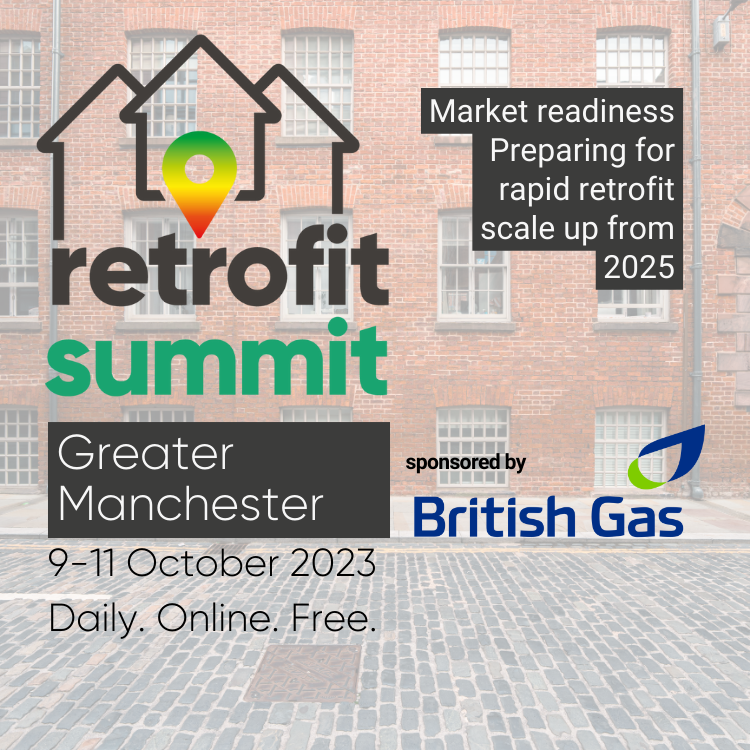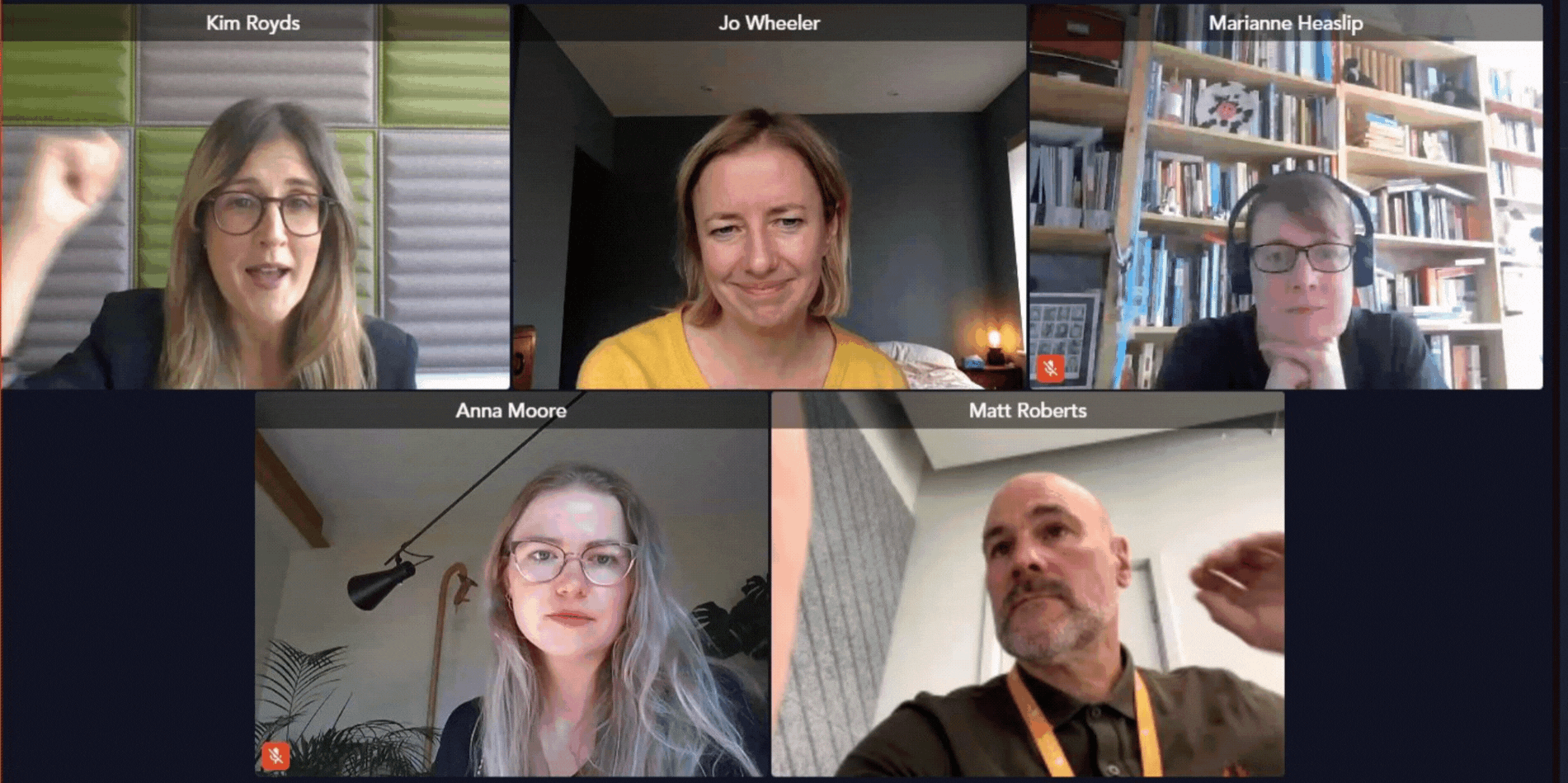Greater Manchester Retrofit Summit Revisited

A key event in Greater Manchester's Retrofit Action Week 2023 calendar, the online summit brought together over 200 speakers and delegates over 3 fast-paced and focused mornings to discuss the challenges and opportunities of retrofitting Greater Manchester homes and to prepare for rapid retrofit scale-up from 2025.

Click 👆🏼 to log into Low Carbon Homes and access all the presentations and panels from the 3 mornings. All free.
Kim Royds, Regional Business Director for the Northwest for British Gas Zero presented results from the second instalment of British Gas’ Net Zero Homes Index. 4000 homeowners were surveyed - 78% said they would be willing to make changes to how they live, and 49% intended to install insulation in the next two years, but there was low confidence in the UK’s ability to implement the green transition. Meanwhile British Gas’s Home Improvement Pilot Programme in nine homes had highlighted challenges with scaling up retrofit: including installer reluctance to work on individual properties rather than large-scale social housing schemes, conservation area restrictions, and long waits for Distribution Network Operator approval for solar installations.

For Day Two, Kim turned to generating customer demand for retrofit. British Gas’s offer includes a money-back guarantee, the Warm Home Promise, if a heat pump they have installed doesn't heat as effectively as a traditional gas boiler after six months, and a detailed, 90-minute Home Health Check energy assessment; as well as a commitment to go out and meet the public to answer questions on energy efficiency and decarbonisation.
Kim's colleague Susan Wells, British Gas Net Zero Fulfilment Director, addressed the summit on Day Three about meeting the yawning retrofit skills gap – including the need for almost 15 times the current number of heat pump installers by 2035, and filling vacancies left by an ageing workforce. Centrica and GMB's Future Energy Skills programme has made recommendations such as more flexibility around training options, and support focused on those who need it most. British Gas is investing in its workforce with its Upskill programme, hiring ‘an apprentice every day’ until 2030, recruiting workers with shortage skills, and a Green Skills pathway for groups such as military service leavers to become installers.
Cara Holmes, Senior Policy Researcher at Citizens Advice unpacked research mapping survey data and consumer interest in energy efficiency measures and capacity to pay onto every constituency. Three broad groups could be identified – those uninterested for now in energy efficiency upgrades, often because of cost (46% of people in Greater Manchester); interested, but unable to afford upfront costs and unwilling to borrow (19% in Greater Manchester); and interested and able to pay (8% in GM).
Some clear, perhaps unexpected features emerged: non-white people were more likely to be interested in energy efficiency than white British people; areas showing the highest level of interest were not necessarily the same as those willing to pay. The results raised a series of questions for Cara Holmes: how can we convince those least interested in retrofit on low incomes of the financial, health and comfort benefits? What packages would make retrofit attractive and affordable to those interested but who can't pay? Can different services and technologies be bundled together for the able-to-pay living off the gas grid?
On the supply chain, Marianne Heaslip of Manchester cooperative People Powered Retrofit highlighted the differences between contractors on large-scale public retrofit programmes and those retrofitting individual homes or a few houses at time, who have to be jack/jill-of-all-trades. She considered barriers to delivering retrofit, such as access to training, the costs of green products, and the ageing construction workforce (plus the industry not always being appealing to work in for women). People Powered Retrofit is trying to address these with practical, convenient and collaborative training sessions and workshops.
Aileen McDonnell described the philosophy of her construction and training company B4Box, which eschews short-term contract work in favour of full-time employees. Delivering home retrofit and refurbishment in a sympathetic way requires a broad skillset, Aileen believes a contractor who can do plastering, carpentry, joinery, painting and decorating, insulation and plumbing is far preferable to a whole team tramping in. With an estimated 500,000 extra workers needed for repair, refurbishment, maintenance and retrofit to decarbonise every UK building, Aileen says, “paying people properly and understanding everyone deserves to live in a decent home will at the same time address the climate issues”. She thinks retrofit is “an open goal” as an employment opportunity, with a many young people now not wanting to go to university and looking to acquire practical skills.

Russ Banton of E.ON described the evolution of Energy Company Obligation (ECO) targets and predecessor schemes since 2005, resulting in 11,700 measures across Greater Manchester so far. He then outlined, and explained the differences between, ECO4 and the Great British Insulation Scheme (GBIS) in scope and eligibility criteria. E.ON can engage and deliver ECO4 and GBIS through three channels - through direct relationships with installers E.ON has worked with over many years and Trustmark or MCS-approved new partners; through engaging local authorities and housing associations; and working with organisations to generate customer leads. In forthcoming social housing retrofits, E.ON seeks to deliver in partnership with community organisations place-based projects, tailored to local needs.
Click 👆🏼 to log into Low Carbon Homes and access all the presentations and panels from the 3 mornings. All free.
Alex Hughes of standards organisation MCS presented the MCS Data Dashboard, which visualises renewables uptake. There have been nearly 47,000 MCS-registered installations in Greater Manchester to date (88% of them solar PV). 2022 and 2023 have seen sustained growth, with the number of installations in 2023 already exceeding the total for 2022 by the time of the summit. Heat pump installation across the Combined Authority area is already 28% higher in 2023 than last year. Nationally more than 4000 businesses are certified with MCS as contractors, with the contractor base growing by 37% since the beginning of the year. Alex hailed Greater Manchester as highlighting best practice around decarbonisation of council properties and hoped Manchester City Council's Home Energy Local Plan, offering low interest loans, might be a blueprint for the sector.

Saint-Gobain Interior Solutions’ Head of Building Better and chair of the BSI Retrofit Standards Task Group Alex Baines drew on personal experience and the 2016 Each Home Counts report, which followed thousands of failures and complaints to government, to illustrate the unintended consequences of retrofit when things go wrong. "We cannot afford to forget the lessons gained,” Alex said, recommending the audience also read new BSI report, The importance of standards for safe energy retrofit. “The challenge we face as an industry is immense". Strict building and installation standards (such as those embodied in PAS25) are imperative, Baines argued, whatever the frustrations about slowing progress on retrofit roll-out, because of the damage that rebounds on the industry from botched, shoddy and unsafe work. There's no magic formula for balancing high standards and stimulating retrofitting, Baines suggests - it comes down to building trust. The setting up of Saint-Gobain Interior Solutions – a collective of British Gypsum, Celotex and Isover - and the partnerships it has forged with other industry bodies is one way of achieving this.

Anna Moore, CEO of retrofit one-stop shop Hestia, explored ways to attract different kinds of finance to the sector. Moore estimates the UK residential retrofit market is worth up to £1.6 trillion over the next 15 years (in works, financing and energy bill savings). She points out how UK property, which produces 23% of carbon emissions only attracts 11% of cleantech funding, with over 80% of this going into newbuilds not existing stock, and tech services rather than installers getting the lion's share. She argues enterprises offering retrofit need to be much more creative about who they approach - eg: mid-market private equity as well as venture capital - seek opportunities in the private sector not just in social housing, and make better propositions to property owners and tenants about the co-benefits of retrofit.
Katherine Burden outlined how Green Economy, which sits within Greater Manchester-headquartered non-profit The Growth Company, supports businesses one-to-one to help them decarbonise. Services that Green Economy offer include a marketplace, a sales hub connecting buyers to suppliers and a green leaders' training course. Since 2011, they have built up a network of 3000 businesses, secured £13 million of sector sales across Greater Manchester and created more than 100 green jobs. They give businesses the opportunity to join supplier networks for the likes of E.ON, put them forward for work through retrofit advice service Your Home Better, and keep them in the loop for green tech projects through the Bee Net Zero partnership.
Other talks included Charlie Baker of Your Home Better consortium on Accelerating Retrofit, Martin Lynch of Seddon Housing Partnerships presenting a case study of refurbishment of Preston’s Fishwick Estate (below), Matt Roberts on the Arrowfield Low Carbon Living Project in Manchester and the Green Finance Institute’s Matt Ferretti.

Click 👆🏼 to log into Low Carbon Homes and access all the presentations and panels from the 3 mornings. All free.
Table break-out discussions between sessions gave participants the opportunity to discuss some of the quirks and challenges of delivering home retrofit, such as engaging customers initially and effective phasing of the work; and gave an opportunity to catch up about how expeditiously different local authorities are moving forward decarbonisation schemes. Attendees new to the sector could network, and for some it was a useful chance to do business.
Panel Discussion Highlights
Day 1 panel
Kicking off Morning 1's Panel, chaired by The Retrofit Hub's/ACAN Sara Edmonds, started with looking at where things currently stand with retrofit - Cara Holmes of Citizens Advice said “We can’t just think about it as low income and people that can pay” with potential markets for retrofit; her research had shown a much more mixed picture of interest level and ability to meet costs. Caught in a chicken and egg situation over whether product development or finding a market for retrofit comes first, Cara conceded that the sector might best start with the already-engaged. Charlie Baker of Your Home Better thought the enthusiasm for retrofit is there, with challenges around trying to scale up what was previously a cottage industry, with too few professionals to meet even the existing demand for work. A major drive on heat pumps can happen simultaneously with trying to roll out insulation, he argued, without undue concern about putting heat pumps in inappropriate properties. “We have to make our own solutions,” he said. “The pieces are there, they just need marshalling into one place. There’s loads of stuff that can happen without waiting for Rishi”.
Steve Pick of British Gas said lessons should be learned from the roll-out of smart metering, which he worked on, in terms of providing the hook for customers to want to find a cost-saving solution. Steve offered the cautionary example of his neighbour who - despite having Pick’s expert advice on hand to choose a (much more suitable for him) solar and battery system - still wanted the discount code for a replacement boiler. Panel chair Sara Edmonds of Architects Climate Action Network (ACAN), who has been studying community-focused retrofit for London councils, asked participants what’s needed to speed up progress. CEO of Lendology CIC Emma Lower emphasised collaboration and operators playing to their strengths. E.ON Business Development Account Manager Russ Banton called for government funding initiatives for retrofit with more longevity, plus finance deals more attractive to able-to-pay customers who are also feeling the pinch.
Day 2 panels
Two panels on morning 2, chaired by UK Green Building Council's Jo Wheeler, considered retrofit financing, including how more sustained funding would enable providers and installers to pay more attention to delivering social value.
British Gas's Kim Royds pointed to very practical consumer concerns over how noisy a heat pump is or where a battery for a solar system would fit in their home. Southway Housing Trust’s Matt Roberts talked about the public's hunger for real data on how green heating technology performs. Marianne Heaslip warned of the damage media and politicians can do by adding uncertainty to green transition policy discussion.

Kim suggested Manchester's Local Area Energy Plans and implementation of these makes the city stand out, and Hestia’s Anna Moore thinks lots of other places "can learn from Manchester's chutzpah". Matt Roberts said housing organisations and installers face big decisions as Greater Manchester's 2038 Net Zero target fast approaches, while Anna Moore believed the Labour Party, on the strength of its party conference, hadn’t had internal conversations about trade-offs around housing and green energy.
Anna Moore warned that with a 97% male, more than 80% white construction workforce, the UK is not going to achieve decarbonisation targets, with Marianne Heaslip and Kim Royds adding there's a task to be done promoting the variety of roles available in retrofit.
Day 3 panels
Morning 3 Panels, chaired by Energy House Labs/University of Salford's Prof Will Swan, kicked off by looking at what’s working. Kim Royds said British Gas had had its best month for heat pumps in September 2023 after funding increased for the Boiler Upgrade Scheme. Aileen McDonnell talked about the success of B4Box’s specialist teams to address damp, mould and condensation problems - cleverly named the 'Run DMC' teams - often caused by botched energy efficiency work.
In terms of what could be done better, Aileen McDonnell argued all domestic site managers should be able to conduct building surveys, to reduce the number of different contractors on site during a project. Alex Baines dwelt on the importance of trust-building – “it’s not what you do, it’s how you do it. It’s about developing relationship and culture”. He calls for a system of independent verification so residents know they are getting the right advice, and stressed the importance of initial assessments.
Asked what more is needed from Manchester’s devolution deal to boost retrofit, the panel debated whether the main issue is more resources, or using resources in a smarter way. On skills and training, they contrasted intense competition for roles (eg: 800 applications for 30 apprenticeships with panellist Martin Lynch’s Seddon Housing Partnerships), with challenges getting existing construction employees to reskill and the impact of perverse incentives in the benefits system on choice of college course. On the Greater Manchester Combined Authority’s role in promoting retrofit, there was agreement that a place-based approach provides the opportunity to demonstrate benefits to Manchester residents in a meaningful way, as well as delivering efficiencies. Aileen McDonell would like to see local authorities able to buy back the worst rental housing from private landlords.
The Greater Manchester Retrofit Summit was truly a non-stop retrofit rollercoaster of information. So much so that Sara Edmonds, Day 1 Panel Chair, said she needed to watch the whole thing all over again to pick up all the great content that was covered over the 3 fast-paced mornings.
Luckily ✨ you - and Sara - can do this. Click 👆🏼 to log into Low Carbon Homes and access all the presentations and panels from the 3 mornings. All free.
Thanks for reading - we hope you found this article and all the free resources helpful for your own housing decarbonisation ambitions. We'll be back fairly soon with the next in our series of Retrofit Revisited looking at Birmingham's action on housing decarbonisation.